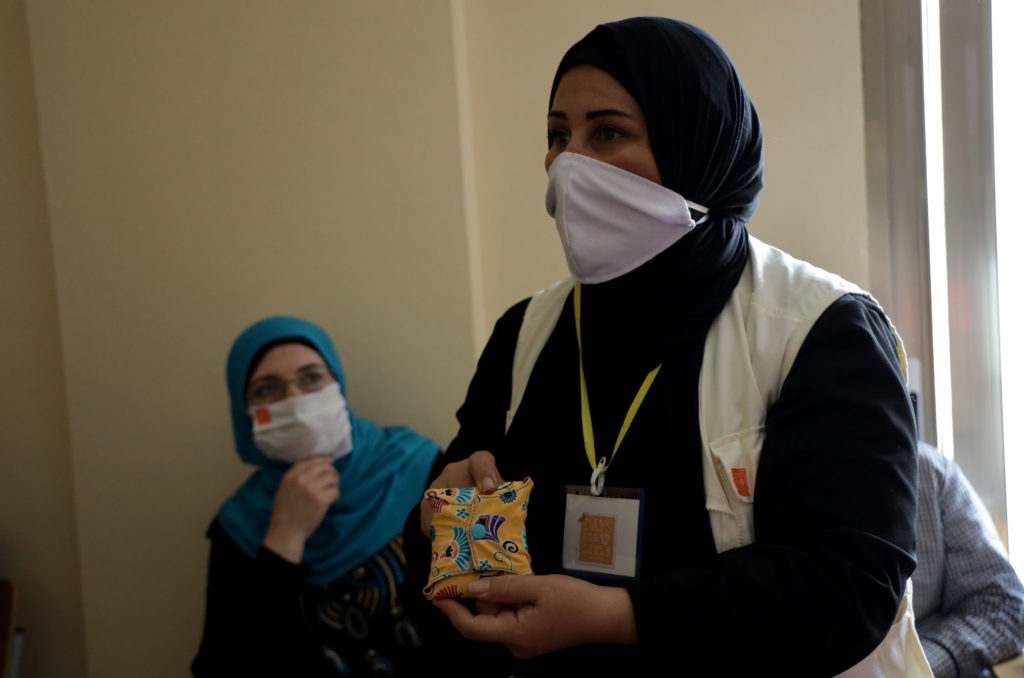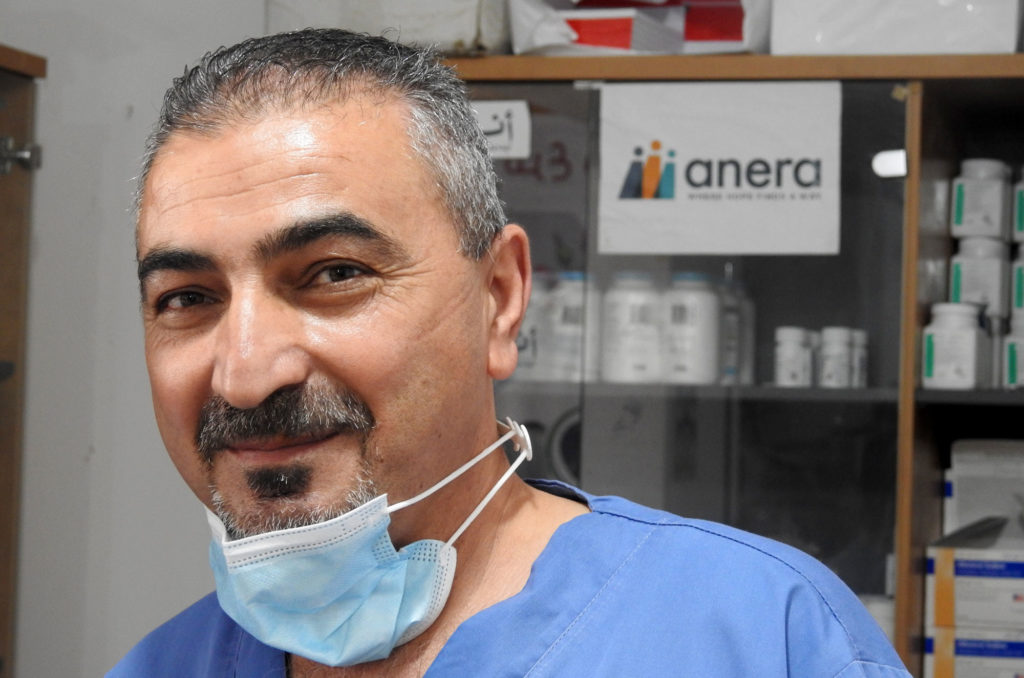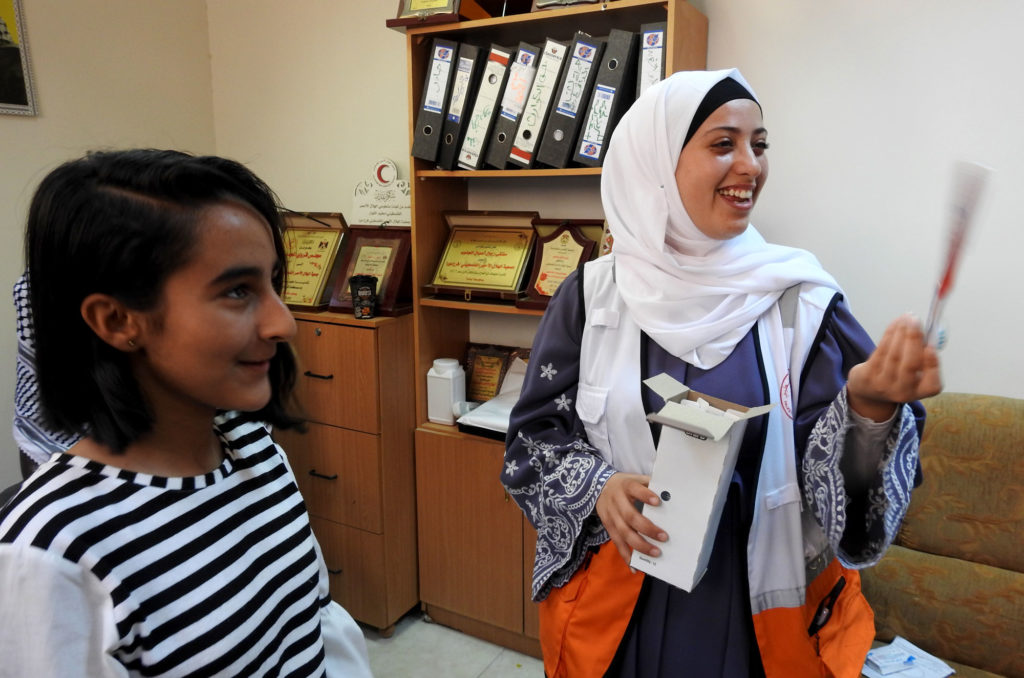Jun, 2021
Improved access to clean water and sanitation and hygiene supplies is crucial for health and dignity in Palestine, Lebanon and Jordan
Food, water, and shelter are necessary for human survival. However, access to clean water, sanitation and hygiene — collectively known as WASH — are also crucial for all communities to help ensure health and dignity. This has never been more important than in the era of COVID-19. The virus that swept the world has highlighted the importance of thoroughly washing our hands and using hand sanitizer. To many of us, this might seem like a simple and straightforward practice — but it’s not that simple for everyone.
For people in crisis areas like Palestine, Lebanon and Jordan, where many are deprived of convenient access to running water, a roof over their heads, or even soap, maintaining proper hygiene can be a real challenge. The UN has recognized the vital importance of ensuring “access to water and sanitation for all,” through Sustainable Development Goal number six.
According to international humanitarian and human rights laws, refugees and people under occupation have the right to access safe and adequate WASH services with dignity. However, in Palestine, water, sanitation and hygiene services are unreliable. Israeli restrictions against development of WASH infrastructure, climate change, and limited local capacities are all challenges according to the WASH Cluster of the State of Palestine.
Likewise, WASH services in Lebanon are inadequate. According to the Lebanon Crisis Response Plan 2017-2021, the pandemic and the Beirut port explosion have deepened the dire need for WASH services across all Lebanese communities in Lebanon. In addition, there is an increasing need for reliable and efficient water systems for institutions such as health facilities. The Beirut explosion damaged water infrastructure and structural rehabilitation is needed.
Education and proper supplies are essential for menstrual hygiene
Menstrual hygiene management is a set of personal hygiene practices that begin with the selection of the best sanitary products, their proper usage, disposal, and body cleaning during menstruation. Proper menstrual hygiene management is defined as “using a clean menstrual management material to absorb or collect blood that can be changed in privacy as often as necessary for the duration of the menstruation period, using soap and water for washing the body as required and having access to facilities to dispose of used menstrual management materials.”
Women and adolescents in refugee camps must often deal with menstruation without adequate information and with limited access to menstrual resources. Secrecy around menstruation has serious implications for menstrual hygiene management and creates anxiety in women and girls.
A study conducted by Oxfam found that girls’ knowledge and awareness about menstrual hygiene in Lebanon is very limited due to the culture of shame that surrounds it. Since girls can’t freely and comfortably discuss the topic, they fall prey to misinformation or simply don’t have the practical information they need about what menstruation is and how to manage it. This has an impact on women's overall health and their feelings of well-being.
Distributing reusable sanitary pad kits in Lebanon
Sanitary pads have become a luxury item for a lot of girls and women in Lebanon as the economy has nosedived over the last 18 months. Many families can’t afford even basic daily necessities, like food. Syrian refugees in tented settlements are even worse off than their neighbors. They are largely frozen out of the labor market and unable to find sources of income. Far too many girls and women are forced to simply go without proper hygiene products. They make do with whatever is at hand. Often they stop their daily routines, worrying about leakage.
With a donation from Americares, Anera has recently distributed washable, reusable pads to 2,200 women and girls living in vulnerable conditions. Americares is a health-focused relief and development organization. The pads come in kits made by Days for Girls International, a nonprofit dedicated to making a washable, reusable, menstrual health pad built to last for up to three years. The kits include soap, washcloths, and waterproof bags to discreetly and safely stow used liners and underwear.
Anera distributed the kits in the most marginalized towns and villages in the north of Lebanon – areas like the Nahr El Bared Palestinian Refugee Camp, the Akkar region, the city of Halba, the village of Bourkayel, Wadi Al Jamous, Bebnin and several others. Each person received multiple Days for Girls pads, a user guide with visual instructions for use and care of the products, and a calendar to track menstrual cycles.
As part of the distributions, Anera staffers and local non-profit partners conducted information sessions about the pads and menstruation management. Many of the young women were initially somewhat skeptical about the idea of washable pads, but they come around to the idea as they learned more about the product and how the pads eliminate monthly costs and last years. For older women, the Days for Girls pads reminded them of the washable cotton cloths they and their mothers once used, before commercial pads were introduced.


Palestinian families get access to WASH services and supplies
In Palestine, Anera has built water and sanitation infrastructure for more than four decades. Access to clean water and reliable sanitation facilities is a chronic problem. Poverty is also prevalent, with unemployment rates in the West Bank at 15%, and in Gaza at a whopping 49%.
Along with building WASH infrastructure in Palestine, Anera often delivers public health awareness sessions for the residents of the impacted area, discussing issues such as waterborne illnesses and proper disposal of waste. We also distribute hygiene supplies for both personal hygiene and home cleaning. Making simple items available at no cost can be a real help to families with few financial resources – items like toothbrushes.


Improving dental hygiene in the Palestinian West Bank
Studies indicate that children in the West Bank have higher than normal levels of cavities. The ability to maintain proper dental hygiene is a fundamental aspect of physical health. Gum disease and oral infections can significantly impact the whole body and lead to many other health problems during a person’s lifetime.
In a recent donation of medical aid, Americares sent 88,704 Oral B toothbrushes for distribution in the West Bank. These are top quality toothbrushes that are prohibitively expensive for many Palestinian families. Making these new toothbrushes readily available is part of the solution to preventing cavities among Palestinian children in the West Bank.
Often cavities go untreated, which leads to significant pain for the afflicted children and negative health impacts like weight loss and difficulty sleeping, as well as absences from school. One survey found over 95% of West Bank children assessed had cavities and many of them were in pain. It seems that the problem is worse in Palestine than elsewhere in the Levant region. Predictably, children from disadvantaged families are most impacted. Medical aid can help in reducing financial barriers to dental care.
Anera has distributed the toothbrushes donated by Americares to seven medical facilities across the West Bank: the Hebron Charitable Medical Center, the Palestine Medical Relief Committee, Ahli Hospital, the Patient's Friends Society (Yabaad), PRCS Idna, the Yazour Charitable Society, and PRCS Dura.
Ameera is a 14-year-old girl from the village of Dura village in the Hebron governorate of the West Bank. The eighth-grader, occasionally, goes to the dentist because of tooth decay. “I used to eat a lot of candies when I was younger, but that was ages ago. I stopped,” she says. “I brush my teeth every day, of course, once in the morning and again in the evening. So it is twice a day! I am here today at the Red Crescent for treatment,” she adds. Ameera has a sinus infection and she gets treatment for her eyes too. We do have a couple of health centers here, however Dura’s Red Crescent is the best one to trust, and that’s why I came here too.”


“I brush my teeth every day, of course, once in the morning and again in the evening. So it is twice a day!"
“The clinic distributes toothbrushes to the patients here as part of our regular hygiene awareness activities,” says Maya Shwamrah, a volunteer at the Red Crescent Clinic in Dura village. “We visit nearby schools and refugee camps to raise awareness about hygiene standards and also distribute toothbrushes. We especially want to reach young people because they tend to be careless or lack information about maintaining good health habits. The toothbrushes we give them are an incentive to build good daily routines. Recently we distributed 1,000 toothbrushes [from the Americares shipment] in just one day!”


“The toothbrushes we give them are an incentive to build good daily routines."




